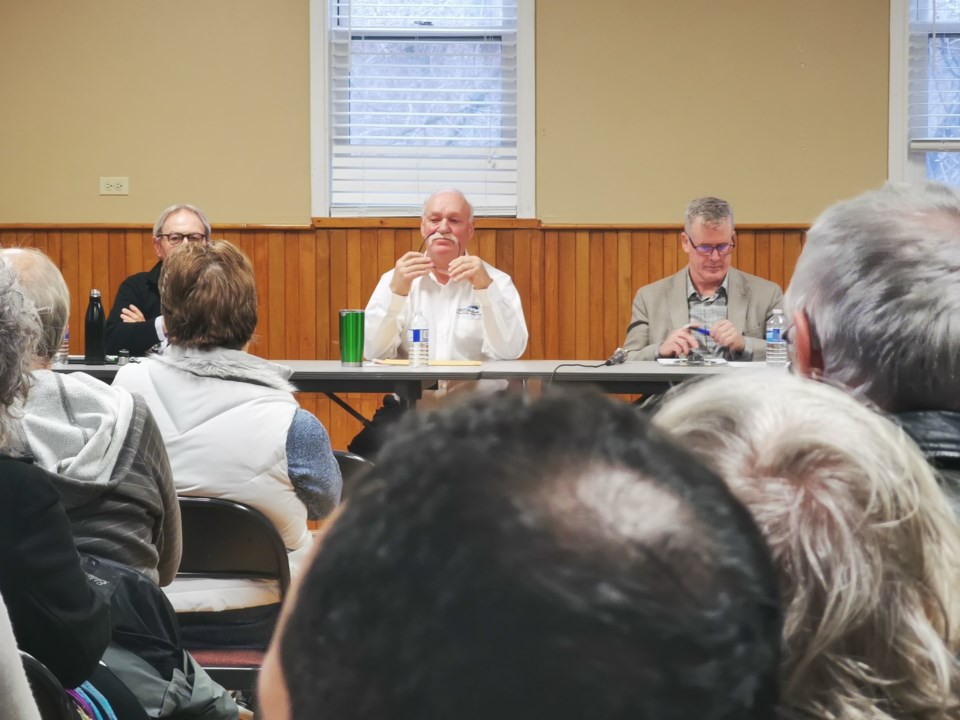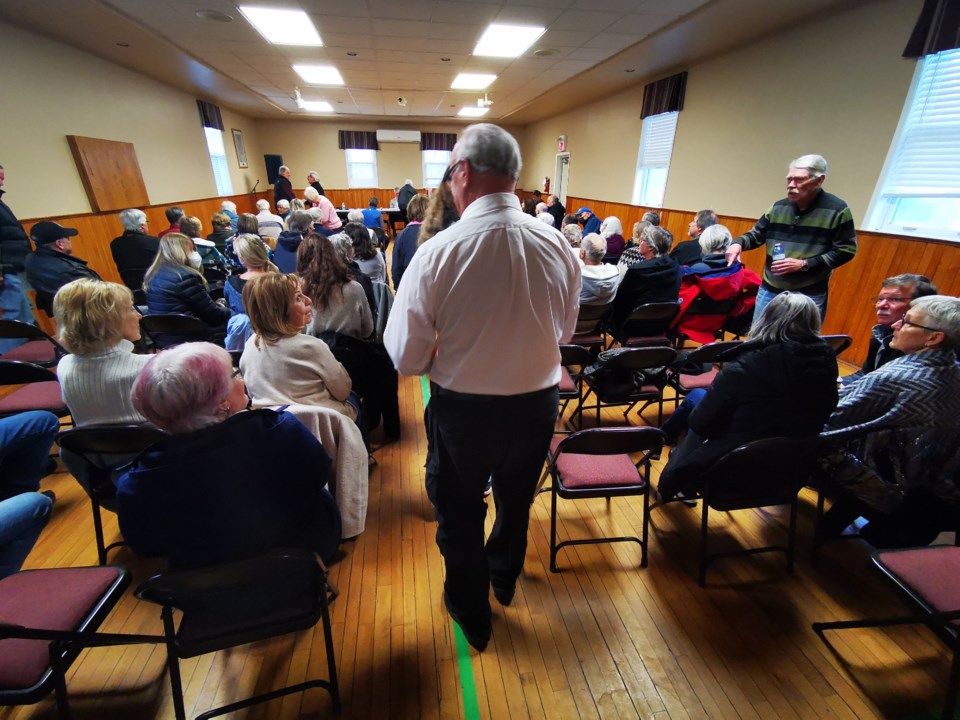Finding a parking spot outside the Hawkestone Community Hall on Sunday was not an easy task.
Nor was finding a seat inside, as the majority of them were taken by Oro-Medonte residents who had travelled from across the township to attend the Ward 5 Town Hall and hear the latest updates from Mayor Randy Greenlaw, Deputy Mayor Peter Lavoie and Ward 5 Coun. Richard Schell.
The town hall event, hosted by the Oro-Medonte Community Coalition Corp., was focused on the top three issues currently facing the township: cannabis, short-term rentals and the boundary expansion plans of both Barrie and Orillia.
During his introductory remarks, Greenlaw provided those in attendance with the dates of upcoming hearings: the case management conference on cannabis will be heard Dec. 11; Zone 1 water issues will be heard the week of Jan. 19, 2024; and the short-term rentals appeal will be heard the week of Jan. 22, 2024.
Lavoie added that the full Ontario Land Tribunal (OLT) hearing on cannabis will be next July, and Schell let residents know he’s lived through two annexations and is available to help them with questions.
The town hall opened with an update on cannabis, from Lavoie.
“As a matter of public record, the new member of the OLT has directed the parties to find a solution by way of setbacks,” he told the audience. “They’ve essentially ruled out, by way of the OLT chair, the question as to whether or not growing cannabis outdoors is the question remaining for the OLT to determine.”
According to Lavoie, there are currently three cannabis operations in Oro-Medonte and the township has reached settlements with two of them, but the third one, 918 on Line 3, has a single OLT hearing remaining.

Greenlaw added more clarity to Lavoie’s comments.
“One thing we have to realize and take into consideration is OMAFRA (Ontario Ministry of Agriculture, Food and Rural Affairs), the provincial body that oversees agriculture, will not identify specific crops,” the mayor explained. “They deem agricultural land is for crop-growing and, since the federal government legalized cannabis, they deem it as a crop — no different than tomatoes, squash or hay.”
Greenlaw said OMAFRA manages pig farms and livestock farms by setbacks and that’s what the OLT has asked the township to discuss with the cannabis operators.
“Economically, I think that’s the place we’ll go first and see if we can find an amicable solution,” Greenlaw said. “It’s not going to be a home run for anybody, but at the end of the day, I did run on making sure we clean up these things and not spend thousands and thousands of dollars on litigation.”
When asked what the setbacks might be, Greenlaw said the setbacks the public wants "will not match what the operator wants.”
He suggested the township come to a resolution with the existing operators and then introduce a bylaw that would include a one-kilometre setback around all settlement areas in the municipality for any future cannabis operators.
Lavoie added that the township’s hands are tied to a large degree because the licence to grow cannabis was issued by the federal government.
“We’ll do what we can, but in all honesty you need to be on the door of the provincial and federal representatives,” Lavoie said. “There’s not a lot we can do. We beseech you to make sure that they (feds and province) know.”
The short-term rental discussion started with Lavoie giving an update on the OLT’s 2022 decision, which he called “reasonably flawed with regards to its reason and some of its legal positions.”
At the time of the OLT decision, Lavoie said, Oro-Medonte had about 70 short-term rentals. Today, there are about 455 operators, he added.
“The township takes the position that the operation of commercial accommodations in residential zones where it’s not permitted is a violation of the zoning bylaw,” Lavoie said. “There are places where it is permitted and this whole misconception that they’re banned in Oro-Medonte is incorrect.”
Lavoie said commercial accommodations are legal in Village One in Horseshoe Valley. He also said you can currently operate a bed and breakfast in a rural agricultural zone, but that will change when the new Official Plan is adopted.
Greenlaw said council will get the short-term rental issue closed up this current year.
With less than 15 minutes left in the scheduled town hall, attention turned to annexation and the actions of the township’s northern and southern neighbours.
Greenlaw said the City of Orillia started a land-needs study in 2018 and they’ve had very open discussions. Greenlaw said the priority for Orillia’s mayor is not building homes — he’s focused on other issues — but he is open to the township proposing to the province that they build the homes and they are added to Orillia’s target.
“As an agricultural township, we don’t have a housing target,” Greenlaw said. “We could build those houses along that border, which would be beneficial to the township from development charges and a tax base and we’d tie into their infrastructure for water and wastewater and pay a premium hook up fee. Water billings would go to the city of Orillia.”
Greenlaw said dealing with Orillia has been easy. However, he called dealing with the City of Barrie “challenging.”
According to Greenlaw, Barrie contacted Oro-Medonte in January about a potential “partnership” that would be very beneficial to both municipalities.
Following a couple of meetings, Greenlaw said it became apparent that Barrie was looking for an annexation, not a partnership.
“Each meeting morphed more and more unfavourably for Oro-Medonte,” Greenlaw said. “It’s not a partnership.”
He added that Oro-Medonte council has not voted on the Barrie proposal, but he was confident the proposal was “a boat that will not float.”
Ward 3 resident Craig Wood wanted to know what Oro-Medonte residents could do to help township council “in this battle against the City of Barrie.”
Greenlaw suggested people reach out to their local MPP and tell them this plan doesn’t work for Oro-Medonte.
“If you could write to Doug Downey or Jill Dunlop to stress your concerns, that would be great,” Greenlaw said.

